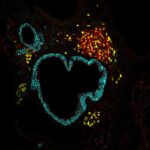
Publication: The transcriptional repressor Gfi1 prevents lupus autoimmunity by restraining TLR7 signaling.
Publié dans: Eur J Immunol 2016 Dec; 46(12): 2801-2811
Auteurs: Desnues B, Macedo AB, Ordoñez-Rueda D, Roussel-Queval A, Malissen B, Bruhns P, Malissen M, Alexopoulou L
Résumé
The transcriptional repressor growth factor independence 1 (Gfi1) is important in myeloid and lymphoid differentiation. In the current study we evaluated the involvement of Gfi1 in systemic lupus erythematosus (SLE). We found that Genista mice, which carry a hypomorphic mutation in the gfi1 gene or Gfi1-deficient (Gfi1-/- ) mice develop signs of spontaneous lupus autoimmunity, including increased serum levels of IgM and IgG2a, autoantibodies against RNA and DNA, glomerular immunodeposits and increased frequencies of plasmablasts, germinal center (GC) B cells and age-associated B cells (ABCs). On the contrary, Genista mice deprived of TLR7 did not show any of these phenotypes, suggesting that the observed lupus autoimmunity in Genista mice is TLR7-dependent. Moreover, Genista mice showed an increased activation of dendritic cells (DCs), B and T cells that was dependent on TLR7 for DCs and B cells, but not for T cells. Upon TLR7 or TLR4 stimulation Genista DCs produced increased amounts of TNF, IL-6 and IFN-β and showed increased NF-κB phosphorylation and IRF7 nuclear translocation, suggesting that Gfi1 controls the NF-κB and type I IFN signaling pathway downstream of TLRs. Our data reveal that Gfi1 plays a critical role in the prevention of spontaneous lupus autoimmunity by negatively regulating TLR7 signaling.
Lien vers Pubmed [PMID] – 27600904
Lien vers le DOI – 10.1002/eji.201646573

